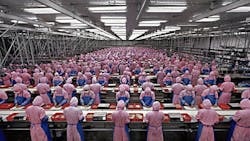The June 11 article Apple’s U.S. iPhones Can All Be Made Outside of China probably should give the decision-makers in China some pause.
Manufacturers that have made themselves totally dependent on a China-based supply chain are asking for trouble. Purchasing should always have a Plan B in the event that catastrophic events break a link—or several links—in the supply chain. I classify the current tariffs as a (necessary) catastrophic event.
Apple’s primary iPhone contract manufacturer is Taiwanese-based Foxconn/Hon Hai, who currently manufacturers and sources the greater share of its phone production and sourcing in China. Currently, though, about 25% of their phone production is produced and sourced outside of China. Talk about a ready-made Plan B! A Foxconn executive goes on to say in the article that Foxconn can quickly ramp up that capacity so iPhones destined for the U.S. market are produced outside of China.
If it comes to this, that would mean even should our trade differences with China be (somewhat) settled, that country would likely permanently lose at least part of their current iPhone production over the longer term. I suspect that Foxconn’s announcement struck a pretty loud note in this regard.
I wonder how many other OEMs have similar non-China Plan B’s should the need for Chinese tariffs extend over time. If they do, announcing them as FoxConn and Apple did might help facilitate a satisfactory completion of current trade negotiations between the U.S. and China.
Corporate Power
A June 4 article in Politico cited some points from the economic plank of Elizabeth Warren, quoting a speech she made:
“American companies [large corporations] wave the flag [but] show only one real loyalty: to the short-term interests of their shareholders, a third of whom are foreign investors.”
And:
“The truth is that Washington policies—not unstoppable market forces—are a key driver of the problems American workers face. From our trade agreements to our tax code, we have encouraged companies to invest abroad, ship jobs overseas, and keep wages low.”
Tucker Carlson commented on these points on his daily Fox News show, praising Warren’s economic plan, saying “She sounds like Donald Trump at his best.” That was, of course, before he roundly criticized her on about all other portions of her platform! Anyway, it was nice to see a bit of common ground here.
But they both missed making an important point. Specifically, U.S. corporations have built U.S trade policies through their lobbying and contributions to political campaigns. If you doubt that, take a look at what I consider some key facts that Congress and Presidential Administrations have imposed on us over the last 30 years.
Read more Supply Chain Initiative columns by Paul Ericksen
1. NAFTA. Remember the 1992 presidential campaign? Ross Perot was the only one of the three major candidates to oppose this pact, saying that NAFTA was not a two-way street and would create a " giant sucking sound" of jobs going south to the cheap labor markets of Mexico. He should have stated that it would be primarily large U.S. corporations—again, through their lobbying and political contributions—creating that sucking sound.
How did NAFTA work? Not very well for American workers. The primary beneficiaries were large U.S corporations. And don’t pin the blame of either of the two major political parties; blame both. Remember, NAFTA was a primarily a Republican initiative but the Democratic President signed it.
2. China being admitted into the World Trade Organization in 2001. The U.S. supported this deal for their entry, which required China to make significant changes to how they conducted trade, while at the same time allowed for that country’s deeper integration into the world economy. How’d that work? Not very well for American workers. The primary beneficiaries were large corporations and the Chinese.
3. 2017 federal tax breaks. It was hoped that these tax breaks would encourage large corporations bring their manufacturing back to the U.S. How many new living-wage jobs have these corporations and created in the United States since then? Not many. And there is no indication they will. So to date, the breaks haven’t done much for American workers who, by the way, got very little tax reduction and face future inflation since the breaks are projected to significantly increase our national debt.
Instead, the primary beneficiaries of the tax reductions are corporations. The reductions have led to record corporate profits, larger CEO bonuses and a booming stock market in which 90% of American citizens aren’t significantly invested and one-third of all stock ownership is by foreigners.
See a pattern here?
So, according to Warren, it is entirely appropriate to place a large portion of the responsibility for “the problems American workers face” on the backs of U.S. corporations. And although many won’t want to hear this, it is also appropriate to place responsibility on American voters, who have continually elected politicians who cater to large corporations. Personally, I think we can do better.
Paul Ericksen is IndustryWeek’s supply chain advisor. He has 38 years of experience in industry, primarily in supply management at two large original equipment manufacturers.
About the Author

Paul Ericksen
Executive Level Consultant; IndustryWeek Supply Chain Advisor
Paul D. Ericksen has 40 years of experience in industry, primarily in supply management at two large original equipment manufacturers. At the second he was chief procurement officer. He then went on to head up a large multi-year supply chain flexibility initiative funded by the U.S. Department of Defense. He presently is an executive level consultant in both manufacturing and supply chain, counting Fortune 100 companies among his clientele. His articles on supply management issues have been published in Industrial Engineering, APICS, Purchasing Today, Target and other periodicals.
